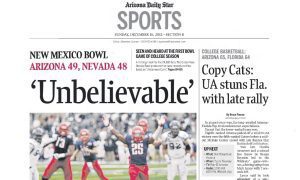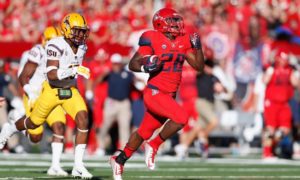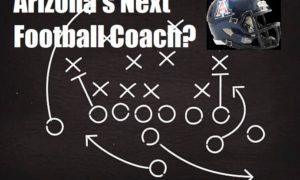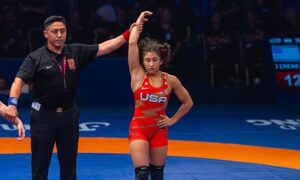[ezcol_1half id=”” class=”” style=””]
HIGHEST UP-TEMPO OFFENSES
Play-per-game averages listed
Source: NCAA
[table “” not found /]
[/ezcol_1half]
[ezcol_1half_end id=”” class=”” style=””]
Not so fast … Arizona coach Rich Rodriguez is saying about a proposed NCAA football rules change designed to slow down up-tempo offenses such as the Wildcats feature.
Apparently, Nick Saban and Bret Bielema would rather force legislation of slowing down no-huddle offenses rather than try to defend them.
The proposal of the NCAA rules committee announced Wednesday would allow defensive players to substitute within the first 10 seconds of the 40-second play clock, except for the final two minutes of each half. Current rules state that defensive players aren’t guaranteed the opportunity to substitute unless the offense first substitutes.
Rodriguez’s spread offense is predicated on an uptempo speed to run plays before the opposing defense is set. The Wildcats ranked seventh nationally in 2013 with an average of 83.2 plays per game. Bielema’s Arkansas team ranked No. 121 out of 125 FBS teams with 64.7 plays per game, while Saban’s Alabama team (65.9) was 116th.
Saban and Bielema argued last summer that up-tempo offenses are more likely to cause injuries for defensive players who can’t get off of the field in time.
[/ezcol_1half_end]
“What’s next? You can only have three downs? If you play that extra down, you have more chance of injury.” — Arizona coach Rich Rodriguez
“This rules change is being made to enhance student-athlete safety by guaranteeing a small window for both teams to substitute,” Air Force coach Troy Calhoun, chair of the rules committee, said in a prepared statement. “As the average number of plays per game has increased, this issue has been discussed with greater frequency by the committee in recent years and we felt like it was time to act in the interests of protecting our student-athletes.”
According to ESPN.com, the committee, which met this week in Indianapolis, believes 10 seconds of substitution time wouldn’t inhibit offenses from operating quickly. Research indicates that offenses rarely snap the ball before 30 seconds remain on the play clock.
The NCAA’s playing rules oversight panel will discuss the proposed change March 6.
“It’s ridiculous,” Rodriguez told ESPN.com. “For me it goes back to the fundamental rules of football. The offense knows where they are going and when they are going to snap the ball. That’s their advantage. The defense is allowed to move all 11 guys before the ball is snapped. That’s their advantage.
“What’s next? You can only have three downs? If you play that extra down, you have more chance of injury.”
Rodriguez also told ESPN.com about the supposed increased chance of injuries for defenders: “If that was the case, wouldn’t every team that went fast in practice have more injuries?”
The committee also proposed removing a 15-yard penalty when replay officials overturn a targeting disqualification foul, as long as no other penalty is called on the play. The initial targeting policy stated that even if a targeting penalty is overturned and a player avoided an ejection, his team still would receive a 15-yard penalty. The add-on penalty received widespread criticism from coaches.
WILDABOUTAZCATS.net publisher, writer and editor Javier Morales is a former Arizona Press Club award winner. He also writes articles for Bleacher Report and Lindy’s College Sports.
[rps-paypal]
|
|






























